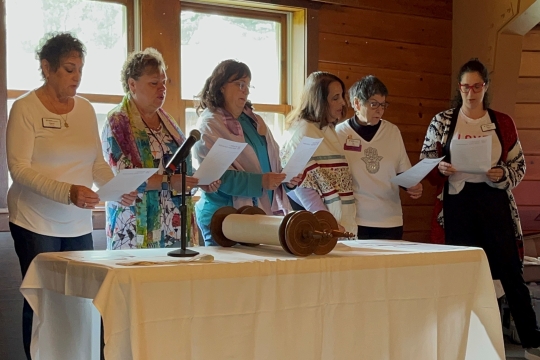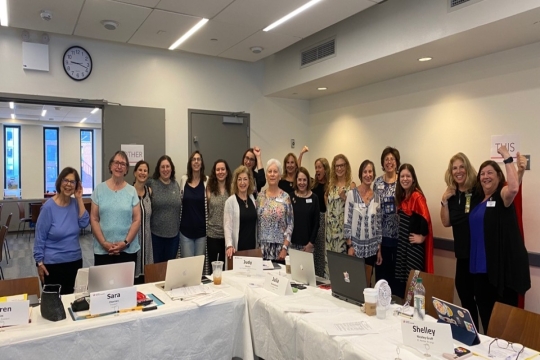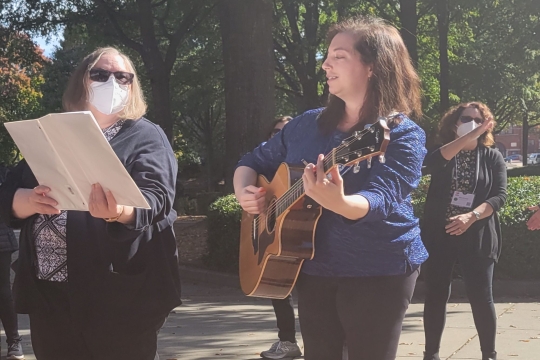
Every year, at our WRJ Board Meeting, we get a list of weekly Torah portions and women sign up to write Voices articles. I approach this with some trepidation because, for me, this is completely outside my comfort zone. I usually manage to find something I can work with; something I can relate to, something that moves me. That is the beauty of Torah, you can always find a nugget and figure out how to tell a story.
This year, like everything, the list was posted online. For the first time, I knew which parashah I wanted to write about. I raced to see if someone had already claimed Chayei Sarah. I was in luck; it was still available. I am not going to discuss the actual parashah but rather, the feelings that Chayei Sarah evokes in me, year after year. I am not sure if this is due to the pandemic or some recent high holiday introspection, but for some reason, I wanted to share something a little more personal.
In 2004, I attended my first WRJ District 3 convention. I got a flyer in the mail - (the mail!) - and as a sisterhood president, who felt like she was in over her head, I thought I might learn something. I signed up, not knowing a soul, and drove to Albany, New York.
I was terrified. This was not something that I did. I had no idea what this was going to be about but the idea of spending a weekend in a hotel room alone - well that certainly sounded like fun!
I was greeted warmly by the woman sitting at the registration table who told me how brave I was to come alone. I got my “first-timers” ribbon which acted as a magnet and suddenly, I was talking to people from all over NY and Canada.
Three things happened that weekend. On Friday night, when saying Mi Sheberach, Cantor Josee Wolff, who was leading the service, offered the name of my cantor before I did. I was surprised as I had not yet realized how interconnected our Reform Jewish world was. This was my first exposure to Jewish geography. She and I spoke later, and she was a comfort to me as we both knew Cantor Colson was very ill.
I went to a workshop with then WRJ President Helene Waranch. I don’t remember the workshop topic. I admit to feeling a mixture of intimidation and being starstruck. Helene was wearing her signature red power color, and she commanded a room like no one else I had ever seen. I asked a question because our sisterhood didn’t have a Constitution, and I had no idea what to do or how to do it. And Helene said to me, “You can do anything you set your mind to.” To this day, I tell anyone that will listen to how that singular phrase changed my life.
What does any of this have to do with Chayei Sarah? The third thing that happened was during Saturday morning Torah Study. I almost skipped it because it sounded boring, completely over my head, and I had never “studied” Torah. I hadn’t started going to services until a few years before, and it was mostly Friday night family services. I knew some stories but not many. In some ways, I was learning with my children.
Sitting at round tables in small groups, we were given topics and asked to choose one as a group. I only remember two of the topics. One was to discuss what Abraham may have said when negotiating for the purchase of Sarah’s burial plot. My group discussed the writing of Sarah’s eulogy, given by Abraham. I remember being dumbstruck when I realized how few women were in the Torah and that the “Life of Sarah” was rare. I can still remember how I felt when we discussed Sarah’s reaction when she woke up to find Abraham gone the morning he took Isaac up to Mt. Moriah. Would he have apologized during the eulogy? Had he ever apologized? My mind was literally blown and a whole new world opened. Looking at Torah from a woman’s perspective was an entirely new and intriguing concept.
When I think about Chayei Sarah, I think about that weekend and how everything changed for me. I think about the connections of our Reform Community, how we pull together in times of crisis, and how small our world really is. I think about learning the value of studying Torah and how, as difficult it may seem at first, it gets easier, the more you dive in. It’s about sharing ideas with others and educating yourself. It’s about applying the words written so long ago to life today and seeing what lessons we can learn. I think about being mentored by Helene Waranch, Rosanne Selfon, and Karen Sim, along with many other brilliantly talented women. These women believed that even though I had so much to learn, I had my own unique gifts.
Each of us starts out in a different place. Each of us has a place with Women of Reform Judaism. That is the power of WRJ.
Related Posts

Parashat Yom Rishon shel Rosh HaShanah

Cultivating a Culture of Accountability and Belonging

